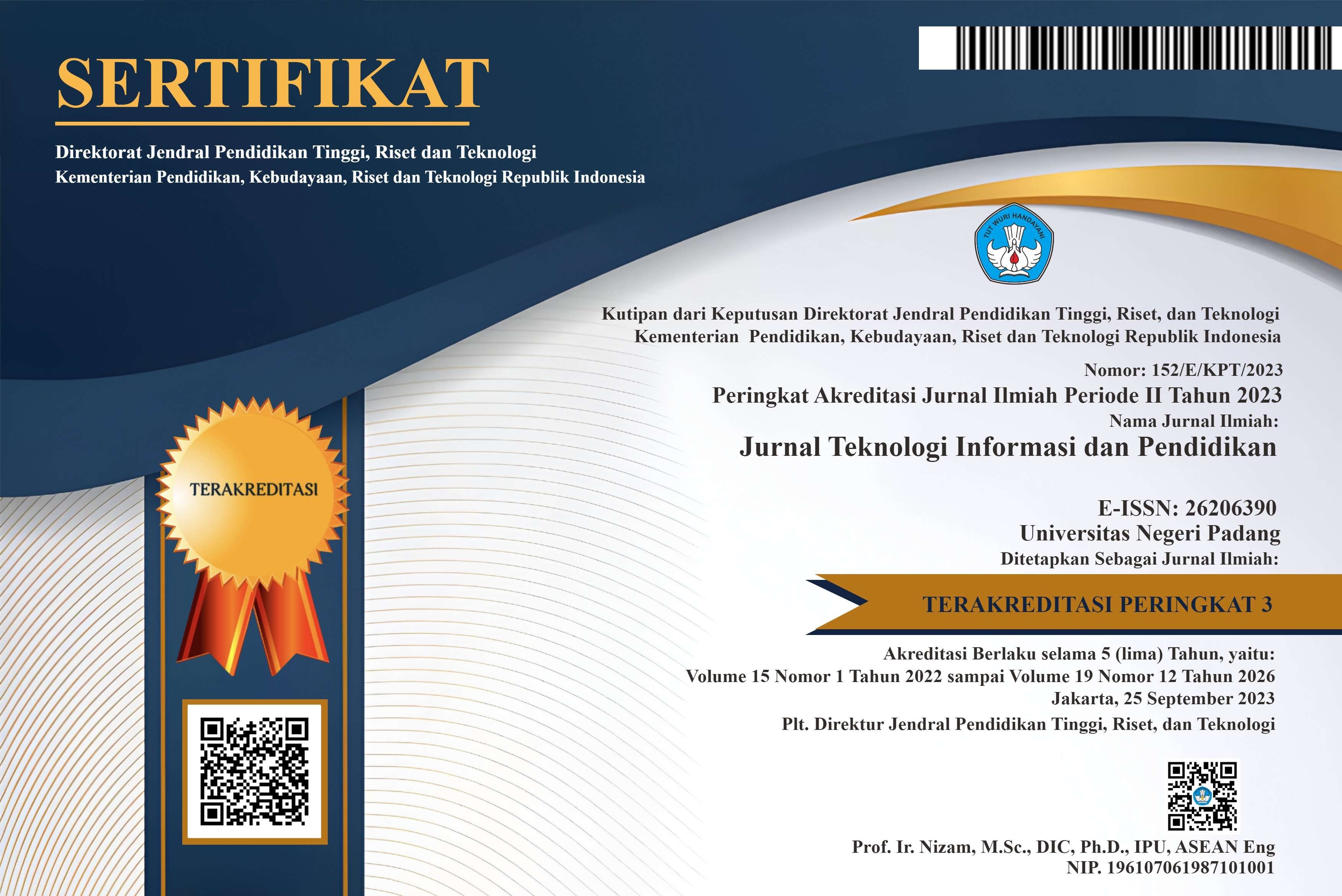The Correlation of High School’s Report Values with Grade Point Semester in College’s First Year Using Principal Component Analysis
Abstract
The first year in higher education is a crucial time that becomes a fundamental learning momentum for every student. Academic achievements in the college's first year are one of the problems that should be checked. Grade point in the first year becomes one of the success study criteria for the next year at an academic time. In department X of a private university, we found some problems in the courses, such as the mean of graduation time that has not met the target. There is an opinion that the grades of report cards at the time of senior secondary education correlate with the achievement index in the first year of college. This research used Principal Component Analysis (PCA) method and data processing with RStudio version 3.5. The students' data for data processing were from the class of 2015 until 2018. Based on the results, it was found that there was no correlation between student report cards in senior secondary education with grade points for the first and second semesters. However, there was a correlation between report cards scores for Chemistry and Biology so that new student admissions could take report cards scores only for one subject.
References
D. Raju and R. Schumacker, “Exploring student characteristics of retention that lead to graduation in higher education using data mining models,” J. Coll. Student Retent. Res. Theory Pract., vol. 16, no. 4, pp. 563–591, 2015, doi: 10.2190/CS.16.4.e.
Sulistiowati, “Pengaruh Jurusan Dan Nilai Sekolah Menengah Terhadap Prestasi Belajar Mahasiswa Program Studi S1 Sistem Informasi STIKOM Surabaya,” in Prosiding Seminar Nasional Sistem & Teknologi Informasi, 2013, pp. LL-13-LL–20.
K. Al Hazaa et al., “The effects of attendance and high school GPA on student performance in first-year undergraduate courses,” Cogent Educ., vol. 8, no. 1, pp. 1–19, 2021, doi: 10.1080/2331186X.2021.1956857.
T. Cardona, E. A. Cudney, R. Hoerl, and J. Snyder, “Data Mining and Machine Learning Retention Models in Higher Education,” J. Coll. Student Retent. Res. Theory Pract., vol. 0, no. 0, pp. 1–25, 2020, doi: 10.1177/1521025120964920.
M. S. Canque, L. Matthew, C. Derasin, and L. L. Pinatil, “Senior High School Background and GPA of the Education Students in a State University in the Philippines,” Turkish J. Comput. Math. Educ., vol. 12, no. 13, pp. 3560–3566, 2021.
Nurhasanah, Purwati, and H. Ahmad, “Pengaruh Sistem Seleksi Masuk Perguruan Tinggi Terhadap Indeks Prestasi Mahasiswa Jurusan Pendidikan Matematika Universitas Papua (UNIPA),” in Prosiding Seminar Nasional, 2015, vol. 03, pp. 114–120, [Online]. Available: http://www.journal.uncp.ac.id/index.php/proceding/article/view/780/653.
M. F. Qudratullah, “Pengaruh Jalur Penerimaan Mahasiswa Dan Asal Sekolah Terhadap Prestasi Mahasiswa Di Fakultas Sains Dan Teknologi UIN Sunan Kalijaga,” J. Fourier, vol. 3, no. 1, pp. 9–15, 2014, doi: 10.14421/fourier.2014.31.9-15.
A. K. Riezky, “Hubungan Hasil Seleksi Penerimaan Mahasiswa Baru dengan Indeks Prestasi Kumulatif pada Mahasiswa Program Studi Pendidikan Dokter Fakultas Kedokteran Universitas Abulyatama,” Seambi Akad., vol. IV, no. 2, pp. 91–95, 2016.
M. R. Alkautsar, Susilawati, and M. B. Azhar, “Hubungan Akreditasi Sekolah , Asal Sekolah , Jalur Penerimaan Mahasiswa dan Tempat Tinggal dengan Indeks Prestasi Kumulatif Mahasiswa Proses pembelajaran merupakan kegiatan utama dalam dunia pendidikan , termasuk di Perguruan Tinggi ( PT ). Keberhasilan p,” Biomed. J. Indones., vol. 4, no. 3, pp. 140–148, 2018.
A. M. Annizar and M. Arifin, “Perbedaan Prestasi Belajar Mahasiswa Ditinjau dari Jalur Seleksi Masuk Perguruan Tinggi,” SAP (Susunan Artik. Pendidikan), vol. 5, no. 3, pp. 197–204, 2021, doi: 10.30998/sap.v5i3.8411.
M. Idris, “Analisis Prestasi Akademik Mahasiswa Teknik Informatika Institut Teknologi Sumatera (ITERA) Berdasarkan Jalur Seleksi Masuk Perguruan Tinggi Negeri,” J. Sci. Appl. Technol., vol. 5, no. 1, pp. 126–130, 2021, doi: 10.35472/jsat.v5i1.410.
D. Raju, “Predicting Student Graduation in Higher Education Using Data Mining Models: A Comparison,” The University of Alabama, 2012.
H. Abdi and L. J. Williams, “Principal component analysis. wiley interdisciplinary reviews: computational statistics,” in Wiley Interdisplinary Reviews: Computational Statistics, 2010, pp. 1–47.
M. Ringnér, “What is principal components analysis?,” What is Princ. Compon. Anal., vol. 26, no. 3, pp. 303–304, 2008.
L. Lukmanulhakim, “Nilai Rapor Sekolah Menengah Dan Hubungannya Dengan Indeks Prestasi Komulatif Mahasiswa,” J. Visi Ilmu Pendidik., vol. 10, no. 1, pp. 1–7, 2018, doi: 10.26418/jvip.v9i1.25958.
J. Noble and R. Sawyer, “Predicting Different Levels of Academic Success in College Using High School GPA and ACT Composite Score: ACT research report series,” 2002. [Online]. Available: http://www.act.org/research/researchers/reports/pdf/ACT_RR2002-4.pdf.
M. T. Sinaga, B. Manurung, and T. Gultom, “Hubungan Nilai Rapor Biologi dengan Kompetensi Biologi Umum I Mahasiswa FMIPA Semester I T.P 2015/2016 Berdasarkan Jalur Masuk di Universitas Negeri Medan,” J. Pendidik. Biol., vol. 5, no. 2, pp. 94–98, 2016, doi: 10.24114/jpb.v5i2.4304.
P. A. Westrick, H. Le, S. B. Robbins, J. M. R. Radunzel, and F. L. Schmidt, “College Performance and Retention: A Meta-Analysis of the Predictive Validities of ACT® Scores, High School Grades, and SES,” Educ. Assess., vol. 20, no. 1, pp. 23–45, 2015, doi: 10.1080/10627197.2015.997614.
R. Ananda, S. Mulyani, H. Sagita, and H. M. Al Mubarok, “Government Problems and Solution to Improve the Quality and Equity of Education in Indonesia,” Edumaspul J. Pendidik., vol. 7, no. 1, pp. 902–909, 2023, doi: 10.33487/edumaspul.v7i1.5718
H. Armi and I. Dewi, “Analysis of Feasibility Level of Interactive Learning Media on Workshop Work Subjects And Technical Drawing”, JTIP, vol. 13, no. 2, pp. 81-88, Jan. 2021.
Copyright (c) 2024 Jurnal Teknologi Informasi dan Pendidikan

This work is licensed under a Creative Commons Attribution-ShareAlike 4.0 International License.
PDF downloaded = 107 times















.png)














